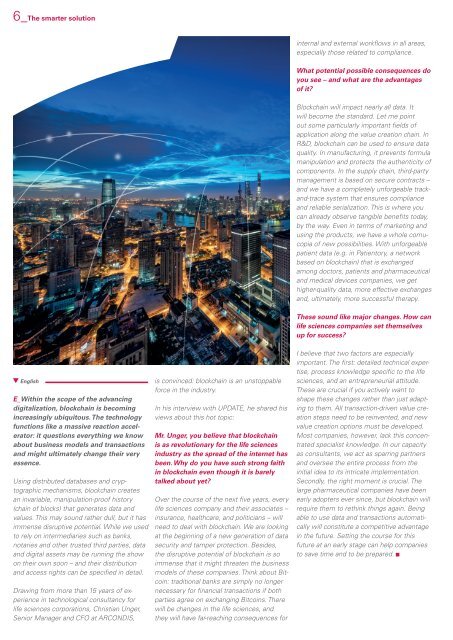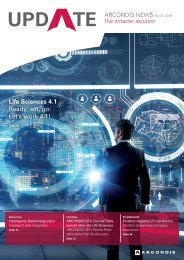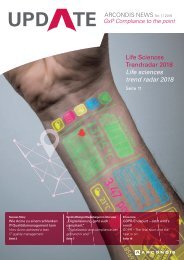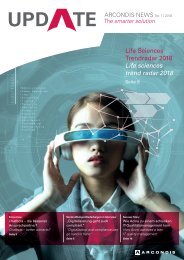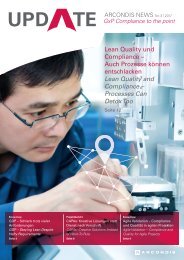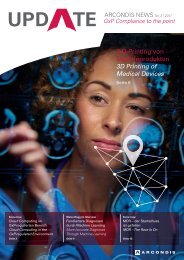ARCONDIS UPDATE No. 03|2017: The smarter solution
ARCONDIS Kundennewsletter für den Themenbereich Business Applications in Life Sciences Unternehmen
ARCONDIS Kundennewsletter für den Themenbereich Business Applications in Life Sciences Unternehmen
Sie wollen auch ein ePaper? Erhöhen Sie die Reichweite Ihrer Titel.
YUMPU macht aus Druck-PDFs automatisch weboptimierte ePaper, die Google liebt.
6_<strong>The</strong> <strong>smarter</strong> <strong>solution</strong><br />
internal and external workflows in all areas,<br />
especially those related to compliance.<br />
What potential possible consequences do<br />
you see – and what are the advantages<br />
of it?<br />
Blockchain will impact nearly all data. It<br />
will become the standard. Let me point<br />
out some particularly important fields of<br />
application along the value creation chain. In<br />
R&D, blockchain can be used to ensure data<br />
quality. In manufacturing, it prevents formula<br />
manipulation and protects the authenticity of<br />
components. In the supply chain, third-party<br />
management is based on secure contracts –<br />
and we have a completely unforgeable trackand-trace<br />
system that ensures compliance<br />
and reliable serialization. This is where you<br />
can already observe tangible benefits today,<br />
by the way. Even in terms of marketing and<br />
using the products, we have a whole cornucopia<br />
of new possibilities. With unforgeable<br />
patient data (e.g. in Patientory, a network<br />
based on blockchain) that is exchanged<br />
among doctors, patients and pharmaceutical<br />
and medical devices companies, we get<br />
higher-quality data, more effective exc hanges<br />
and, ultimately, more successful therapy.<br />
<strong>The</strong>se sound like major changes. How can<br />
life sciences companies set themselves<br />
up for success?<br />
English<br />
E_Within the scope of the advancing<br />
digitalization, blockchain is becoming<br />
increasingly ubiquitous. <strong>The</strong> technology<br />
functions like a massive reaction accelerator:<br />
it questions everything we know<br />
about business models and transactions<br />
and might ultimately change their very<br />
essence.<br />
Using distributed databases and cryptographic<br />
mechanisms, blockchain creates<br />
an invariable, manipulation-proof history<br />
(chain of blocks) that generates data and<br />
values. This may sound rather dull, but it has<br />
immense disruptive potential. While we used<br />
to rely on intermediaries such as banks,<br />
notaries and other trusted third parties, data<br />
and digital assets may be running the show<br />
on their own soon – and their distribution<br />
and access rights can be specified in detail.<br />
Drawing from more than 15 years of experience<br />
in technological consultancy for<br />
life sciences corporations, Christian Unger,<br />
Senior Manager and CFO at <strong>ARCONDIS</strong>,<br />
is convinced: blockchain is an unstoppable<br />
force in the industry.<br />
In his interview with <strong>UPDATE</strong>, he shared his<br />
views about this hot topic:<br />
Mr. Unger, you believe that blockchain<br />
is as revolutionary for the life sciences<br />
industry as the spread of the internet has<br />
been. Why do you have such strong faith<br />
in blockchain even though it is barely<br />
talked about yet?<br />
Over the course of the next five years, every<br />
life sciences company and their associates –<br />
insurance, healthcare, and politicians – will<br />
need to deal with blockchain. We are looking<br />
at the beginning of a new generation of data<br />
security and tamper protection. Besides,<br />
the disruptive potential of blockchain is so<br />
immense that it might threaten the business<br />
models of these companies. Think about Bitcoin:<br />
traditional banks are simply no longer<br />
necessary for financial transactions if both<br />
parties agree on exchanging Bitcoins. <strong>The</strong>re<br />
will be changes in the life sciences, and<br />
they will have far-reaching consequences for<br />
I believe that two factors are especially<br />
important. <strong>The</strong> first: detailed technical expertise,<br />
process knowledge specific to the life<br />
sciences, and an entrepreneurial attitude.<br />
<strong>The</strong>se are crucial if you actively want to<br />
shape these changes rather than just adapting<br />
to them. All transaction-driven value creation<br />
steps need to be reinvented, and new<br />
value creation options must be developed.<br />
Most companies, however, lack this concentrated<br />
specialist knowledge. In our capacity<br />
as consultants, we act as sparring partners<br />
and oversee the entire process from the<br />
initial idea to its intricate implementation.<br />
Secondly, the right moment is crucial. <strong>The</strong><br />
large pharmaceutical companies have been<br />
early adopters ever since, but blockchain will<br />
require them to rethink things again. Being<br />
able to use data and transactions automatically<br />
will constitute a competitive advantage<br />
in the future. Setting the course for this<br />
future at an early stage can help companies<br />
to save time and to be prepared.


